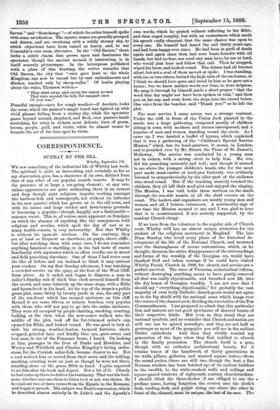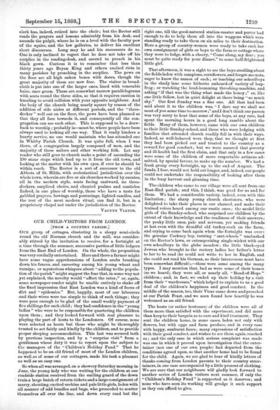CORRESPONDENCE.
SUNDAY BY THE SEA.
Whitby, September 7th. WE saw something of the industrial life of Whitby last week. The spiritual is quite as interesting, and certainly, so fax as my observation goes, has a character of its own, distinct from that of any other of our popular seaside resorts. It may be the presence of so large a sea-going element ; at any rate, unless appearances are quite misleading, there is an earnest and deep though quiet religious impulse working amongst the harbour-folk and townspeople, not without its influence in the new quarter which has grown on to the old town, and with its casino and large cricket and lawn-tennis grounds, is becoming a popular—though, happily, not a fashionable— summer resort. This is, of coarse, most apparent on Sundays, on which the absence of anything like the annoyances, both religious and secular, which spoil the day of rest at so many health-resorts, is very noteworthy. Not that Whitby is without its open-air services. On the contrary, they are at least as frequent as elsewhere, on quays, shore, cliffs ; but after watching them with some care, I do not remember anything fanatical or startling, or in the bad taste of coarse familiarity with mysteries which so often revolts one in street and field preaching elsewhere. One of these I had never seen the hire of before, and am inclined to think it may interest your readers. On my first Sunday afternoon, I was watching a crowded service on the quay, at the foot of the West Cliff, from above. As it ended, and began to disperse, a man in sailor's Sunday suit of thick blue cloth severed himself from the crowd, and came leisurely up the stone steps, with a Bible and hymn-book in his hand. At the top of the steps is a public grass-plot, some thirty by twenty yards in size, the only part of the sea-front which has escaped enclosure on this cliff. Round it are some fifteen or sixteen benches, very popular with those who will not pay to go into the casino enclosure. They were all occupied by people chatting, smoking, courting, looking at the view, when the new-comer walked into the middle of the plot, took off his fur-trimmed sailor's cap, opened his Bible, and looked round. He was good to look at, with his strong, weather-beaten, bronzed features, short- cropped, grizzled hair, and kindly blue eye, part-owner and best man in one of the Penzance boats, I heard. On looking at him, passages in the lives of Drake and Hawkins, and Wesley and Whitfield, and Charles Kingsley's loving enthu- siasm for the Cornish sailor-folk, became clearer to me. Not a soul noticed him or moved from their seats, and the talking, smoking, courting went on just as though he were not there, standing alone on the grass, Bible in hand. I quite expected to see him shut his book and depart. Not a bit of it. Clearly he had come up there to deliver his testimony. That was his busi- ness; whether any one chose to listen to it or not, was theirs. So he read out two or three verses from the Epistle to the Romans, and began to preach. His subject was Paul's conversion, which he described almost entirely in St. Luke's and the Apostle's own words, which he quoted without referring to his Bible, and then urged roughly, but with an earnestness which made his speech really eloquent, that the same chance was open to every one. He himself had heard the call thirty years ago, and had been happy ever since. He had been in peril of death again and again since then, had seen boats founder with all hands, but had no fear, nor need any man have, by sea or land, who would just hear and follow that call. Then he stopped, wiped his brow, and looked round. The sitters had all become silent, but not a soul of them moved or spoke. I was standing, with one or two others, behind the high rails of the enclosure, or I think we should have gone and stood by him as he gave out a hymn ; but we knew neither words nor tune, so were helpless.. He sang it through by himself, made a short prayer " that the word that day might not have been spoken in vain," and then put on his cap, and went down the steps into the crowd below.. One voice from the benches said "Thank you!" as he left the- plot.
The next service I came across was a strange contrast.. Under the cliff, in front of the Union Jack planted in the sands, was a large gathering, composed mostly of children sitting in rows, with mothers and nurses interspersed, and a number of men and women standing round the circle. As I came up, I was handed a leaflet of hymns, which explained that it was a gathering of the " Children's Special Service- Mission," which has its head-quarters, it seems, in London,. and is presided over by Mr. Stuart, the Vicar of St. James's, Holloway. The service was conducted by a young man not in orders, with a strong choir to help him. He, too,. did his preaching earnestly and well; and though it seemed to me above the younger children's heads, who for the most part made sand-castles or mud-pies furtively, was evidently listened to sympathetically by the elder part of the audience who stood round. But if the teaching scarcely touched the children, they all left their mud-pies and enjoyed the singing.. The Mission, I was told, holds these services on the sands. through the sea-side season, at all the chief resorts on the- coast. The leaders and organisers are mostly young men and women, and all, I believe, volunteers. A noteworthy sign of our time the Mission seemed to me, and I was glad to hear that it is countenanced, if not actively supported, by the- resident Church clergy.
If we turn from the volunteer to the regular side of Church work, Whitby still has an almost unique attraction for the- student of the religious movement in England. The late- Dean Stanley, who loved every phase of the historical de- velopment of the life of the National Church, and mourned over the thoroughness of recent restorations, which, as he thought, threaten the entire disappearance of the surroundings- and forms of the worship of the Georgian era, would have- thanked God and taken courage if he could have visited Whitby Parish Church in 1888, for church and service are a perfect survival. The wave of Victorian ecclesiastical reform, without destroying anything, seems to have gently removed all that was really objectionable, and breathed new life into, the dry bones of Georgian worship. I am not sure that I should say " everything objectionable," for probably the vast majority of even truly Catholic church-goers would not agree- as to the big shield with the national arms which hangs over- the centre of the chancel arch, dividing the two tables of the Ten Commandments. I am prepared to admit that this particular- lion and unicorn are not good specimens of discreet beasts of their respective kinds. But even as they stand they are- national symbols, and no reminder that Church and nation are still one can be spared nowadays; and they are not half so grotesque as most of the gargoyles you will see in the noblest. Gothic cathedrals. And then they vividly remind my generation of the days when they first toddled to church in the family procession. The church itself is a gem, though with no orthodox arcliitectural beauty, for it retains traces of the handiwork of thirty generations in its walls, pillars, galleries, and stunted square tower,—from the round arches (there are still two, though the best, a fine Norman window, has been bricked up) of its earliest builders in the twelfth, to the white-washed walls and ceilings and square-paned windows of eighteenth, century churchwardens. I should think the three-decker (I am obliged to use the a profane name, having forgotten the correct one) the clerk's desk, reading-desk, and pulpit rising one above the other in front of the chancel, must be unique, the last of ita race. The clerk has, indeed, retired into the choir; but the Rector still reads the prayers and lessons admirably from his desk. and ascends the pulpit, where he is on a level with the faculty pew of the squire, and the low galleries, to deliver his excellent short discourses. Long may he and his successors do so. One is only inclined to regret that he does not take off his surplice in the read; g-desk, and ascend to preach in his black gown. Curious it is to remember that less than thirty years ago Bryan King and others excited riots in many parishes by preaching in the surplice. The pews on the floor are all high oaken boxes with doors, though the great majority of them are now free. The visitor in broad- cloth is put into one of the larger ones, lined with venerable baize, once green. These are somewhat narrow parallelograms with seats round the three sides, so that it requires caution in kneeling to avoid collision with your opposite neighbour. And the body of the church being nearly square by reason of the addition of side aisles at different periods, and the " three- decker " well out on the floor, the pews have been planned so that they all face towards it, and consequently all the con- gregation can see each other. This is supposed to be a draw- back to worship ; probably is—must be, where people have been always used to looking all one way. That it really hinders a hearty service, no one would maintain who has attended one in Whitby Parish Church. It was quite full, when I was -there, of a congregation largely composed of men, and the majority of these sailors and other working folk. Let any reader who still goes to church make a point of ascending the 190 stone steps which lead up to it from the old town, and looking at the matter with his own eyes, if ever he should be -within reach. The Rector is a sort of successor to the old Abbots of St. Hilda, with ecclesiastical jurisdiction over the whole town, wherein are five or six churches worked by curates, .all in the modern style, seats facing eastward, no three- deckers, surpliced choirs, and chanted psalms and canticles. Indeed, in one place of worship, those who have a taste for gabbled prayers, bowings and posturings, lighted candles, and the rest of the most modern ritual, can find it, but in a proprietary chapel not under the jurisdiction of the Rector.
VACUUS VIATOR.



































 Previous page
Previous page